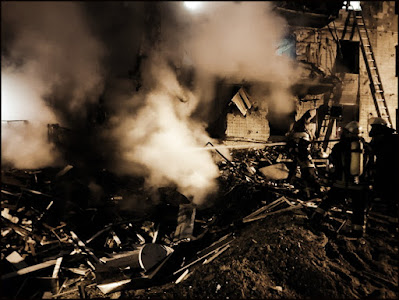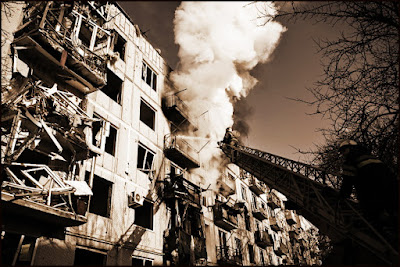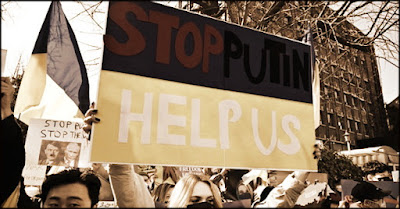The tragedy that is unfolding in Ukraine at the moment is the consequence of the kind of ruthless, murderous, criminal behavior that the world—shocked though everyone seems to be—should by now have come to expect from Russian dictator Vladimir Putin. It is a repetition of the kind of unprovoked invasion and scorched earth tactics that he has commanded during his twenty-two-year reign in places like Chechnya and Syria. And it mirrors the same lack of concern over geopolitical consequences and humanitarian considerations that Putin demonstrated nearly a decade and a half ago in Georgia, where he launched the first European war of the twenty-first century.
But leaving aside the similarities
between the ruthlessness that Putin has exhibited in Ukraine and those he has
employed in earlier armed interventions, there are also historical similarities
between how the world is reacting to this latest naked aggression in Europe by
the Putin regime, and the earlier policy of appeasement that permitted
unfettered expansion by the armies of the most undisputedly emblematic dictator
of the modern era.
Since the two world wars fought in the
twentieth century, “appeasement” has become a technical term for any diplomatic
policy that is based on making concessions to an aggressive power in order to
avoid armed conflict. The term’s most iconic historical application has been as
a means of describing the diplomatic policies of the then all-powerful British
Empire in dealing with the rapid rise of fascism in Germany and Italy and the
brutal expansionist doctrines instituted by both nations—but particularly by Nazi
Germany—in the run-up to World War II.
The scapegoat for the appeasement shown
toward German dictator Adolf Hitler and his Nazi regime has traditionally been
British Prime Minister Neville Chamberlain, who was heading the British
government when Nazi Germany’s aggression in Europe could no longer be ignored
and spilled over into the start of World War II. But truth be told, previous British
prime ministers, including Ramsay McDonald and Stanley Baldwin, had preceded Chamberlain
in their hands-off approach to the brutal rise and aggression of both European
dictators, embracing appeasement even as both Hitler and Mussolini consolidated
their power in Europe in the period between World War I and World War II.
In all fairness, those were different
times, the nineteen-twenties and thirties, when the world didn’t yet have the
historical context of World War II to look back on. World War I was still being
thought of as the “war to end all wars” and as “the Great War”, and most people
at that time couldn’t have imagined that Germany’s European aggression would
once again spark a worldwide conflict that would prove far more deadly and
horrific than the first one. Appeasement, at that time, was not seen as
“backing down” in the face of naked aggression, but rather as a policy aimed at
preserving the peace that had cost all of Europe such tremendous sacrifice
during the First World War.
Appeasement was also seen as the price Europe was paying for the exaggerated and highly vindictive sanctions and contemptuous treatment to which the Allies had subjected Germany following the Great War. There was no more outspoken critic of those sanctions than renowned British economist John Maynard Keynes,
 |
| John Maynard Keynes |
Keynes’ advice fell on deaf ears among
the Allies in their drafting of the Treaty of Versailles and other associated treaties.
And the terrific hardships that the people of Germany suffered in the
post-World War I years are historically cited as the main social and
humanitarian catalyst that permitted Hitler to become the most powerful man in
Germany and the country’s undisputed Fuhrer.
As Great Britain and the US began,
during the late nineteen-twenties, to visualize the consequences of the Treaty
of Versailles, appeasement commenced to be viewed as the most desirable way to
avoid escalating new hostilities between Germany—allied with fascist Italy—and
the rest of Europe. Appeasement garnered powerful support among the British
upper classes, including the House of Lords, British royalty, and big business,
at the time headquartered in the City of London. Conservative media, such as
the BBC and The London Times, were also supportive of appeasement as a
tool of peace.
The left and the lower and middle-class
public at large were, however, far less convinced of the wisdom of permitting
Nazi Germany to aggressively expand without drawing a line in the sand. As
Hitler advanced beyond German borders, much of the liberal press and popular
public opinion decried the former Allied powers’ increasing failure to contain
Hitler and drive Nazi Germany back, Prime Minister Chamberlain could think of nothing
better to do than to impose censorship on the liberal press, meet with Hitler
in Munich and then declare himself the architect of “peace in our time”.
Much in the way that Putin is today
seeing the desire of the West to maintain world peace and not get into a
shooting war with him as acquiescence that he can take advantage of in order to
prosecute his expansionist policies, Hitler seized the opportunity provided by
appeasement to annex Austria, parts of Czechoslovakia, Bohemia and Moravia,
before invading Poland, which finally became a bridge too far, and sparked the
start of World War II.
Historians remain divided on the issue
of appeasement, however, with one school of thought positing that the policy of
appeasement was precisely what permitted Nazi Germany to become so powerful and
to gain such a European foothold while the other school of thought is that in
the run-up to the war, Hitler’s Germany was already so powerful that early
engagement might have permitted him to win the conflict, while appeasement gave
Europe time to better prepare for what was, in the end, an unavoidable
conflagration.
Like Hitler in Germany following the Treaty of Versailles, Putin built his popular strength as a dictator on the rubble of the fallen Soviet Union. As a ranking intelligence officer in the former KGB, Putin worked closely with former head of state Boris Yeltsin, Russia’s first freely elected president following the fall of the Berlin Wall, and managed to become Yeltsin’s protégé. His reputation as a strongman and eminence gris behind Yeltsin placed him first in the line of succession when Yeltsin, in ill-health and highly unpopular after a crippling recession in Russia that some economists have compared to the Great Depression in the US and Europe, resigned from office in 1999. In exchange, one of Putin’s first acts was to provide immunity from prosecution to Yeltsin, who was facing possible charges of corruption and dereliction of duty.
If Yeltsin had tried unsuccessfully to
convert Russia from a seventy-five-year-old communist regime to a free market economy
overnight, Putin took a more pragmatic approach, taking advantage of the more
open market to position himself at the forefront of a highly lucrative
oligarchy that helped him consolidate his power and made him, as well as his
cronies, a very wealthy man into the bargain. Although Yeltsin had considered
the Soviet era over and done with, if anyone was paying attention, it was easy
to see that, despite his taste for capitalism, Putin was nostalgic for the
enormous power that the Soviet Union had wielded on the world stage, and which
had waned to only a shadow of its former self under the post-Berlin Wall
Russian Federation. In this regard, cavalierly relegating the two world wars to
a position of secondary importance, Putin once said that the fall of the Soviet
Union had been, “the greatest geopolitical catastrophe of the century.”
He also took clever advantage of the
so-called “glasnost” policy first introduced by his predecessors Mikhail Gorbachev
and Boris Yeltsin, which actively sought ever-closer ties with the West. He
established strong trade ties with Western Europe and the US and succeeded in
making some of the most powerful countries in Western Europe—most notably
Germany—largely dependent on Russian oil and gas, the Federation’s main export.
He was at first seen in the West, then,
as the new face of Russian democracy and capitalism and gained “most favored
nation” trade status with Western nations including the United States—a status
that, incredibly, even as he lays waste to Western ally Ukraine, he continues
to enjoy, and it is only now that the US and Western Europe are reluctantly
considering revoking it. It wasn’t until he was certain that he was in the best
position possible to ensure that any Western moves against him would not come
without injury to Western economies that he began to reveal who he really was—a
ruthless, anti-democratic dictator with an agenda aimed at rebuilding the
Russian Federation to the level of power once wielded by the Soviets, but
without the all-pervading communist Politburo to hamper him.
Establishing a political partnership
with Dmitry Medvedev in which they basically passed the offices of prime
minister and president back and forth between them for nearly two decades—a
“tandemocracy” as international journalists dubbed it—Putin was clearly always
the strong man and Medvedev his shill. Two years ago, Putin decided that he had
consolidated sufficient autocratic power to dispense with this farse and pushed
Medvedev, who has since been demoted to deputy chairman of the Russian Security
Council, to resign. Medvedev did so, saying that he was leaving office to
permit Putin to introduce constitutional changes—obviously designed to further
entrench him in power permanently.
 |
| "Strategic target" - a Ukrainian kindergarten |
As of the start of his reign in 1999, however, Putin set to the task of re-introducing Russian domination by infiltrating Ukrainian politics and eventually installing a puppet government in Kyiv that was loyal to Moscow and beholden to Putin. In 2013, mass protests erupted in Kyiv and other Ukrainian cities, the main purpose of which was to seek closer ties with the West, and particularly with the European Union. Although opposed by the ethnic-Russian minority—mostly centered in Eastern Ukraine and Crimea—this movement became a full-fledged civil uprising known as the Revolution of Dignity, in which at least ninety-eight people were killed, a hundred went missing and some fifteen thousand were injured. In 2014, the protests boiled over into what was essentially a popular coup d’état, as a result of which Putin’s surrogate Viktor Fedorovych Yanukovych was removed from power and fled to Moscow.
 |
| Putin is using thermobaric bombs that crush the lungs of anyone within their killing range. |
New—this time free—elections were called,
and Petro Poroshenko won by more than fifty percent of the votes, running on a
pro-European Union platform. Since then, Putin has actively and violently moved
to retake Ukraine by force, first through the direct annexation of Crimea and
by providing material and military support to pro-Russian insurgencies in
Eastern Ukraine, and now, with the strengthening of pro-Western overtures under
the government of President Volodymyr Zelenskyy, by means of the full-scale
invasion and destruction of the country as a whole.
The excuse of NATO for not doing more to
militarily help the Ukrainians—among other things, at least establishing a
no-fly zone so that cities in that country don’t have to contend with Russian
air support for its bloody invasion—is that Ukraine isn’t a NATO country. But
it’s not for lack of trying on the part of Kyiv. Since once and for all
declaring its independence from Moscow, the main thrust of Ukraine’s foreign
policy has been to be accepted into the West.
 |
| A Ukrainian school hit by Russian cluster bombs. |
The country boasts significant natural
resources, including lithium, natural gas, kaolin, timber, and
an abundance of arable land with a temperate climate that permits a long
growing season—even if in certain regions it is vulnerable to environmental
issues such as inadequate potable water, air and water pollution, and
radioactive contamination in the northeast due to the Chernobyl atomic reactor
disaster that took place in 1986, while Ukraine was still dominated by the USSR.
 |
| A bombed out apartment building |
Unfortunately, its economic performance
fails to reflect its very real potential since it has always been subject to
the vicissitudes of the Russian economy or has been punished by Russia for
seeking its independence, a problem that Western Europe and the US have failed
to systematically offset. Add to this the fact that, in just three weeks,
Russia is estimated to have destroyed a hundred billion dollars in Ukrainian
economic assets—or a little less than two-thirds of the GDP—and Ukraine is
currently the poorest nation in Europe.
So why hasn’t the EU done more to
embrace Ukraine and make it a progressive Western emerging economy, since the
country is not only willing but eager to do just that? Again, the answer is
appeasement. It is the West caving to Putin’s refusal to allow a sovereign nation
to exercise self-determination. Had the West moved in 2014 to bring Ukraine
into the European Union, and more importantly, into NATO, it would have taken a
much bigger Russian commitment to war than the one it is now making by
ruthlessly invading Ukrainian territory.
While it may be a laudable goal to try and avoid Western armed conflict with one of the world’s two most advanced nuclear powers—especially considering that it is someone as ruthless and brutal as Putin who currently has his hand on the Russian nuclear trigger—as happened with Hitler before World War II, appeasement very likely will prove to be a policy of postponement rather than of avoidance in facing down the Russian dictator. Seeing Putin’s performance to date, it is very hard to imagine that following NATO appeasement in Ukraine, he will not want to test the Western alliance’s resolve in acting on its all-for-one-and-one-for all Western defense policy.
Russia with a defeated Ukraine would
pose an immediate threat to Moldova, Estonia, Latvia, and, thanks to its
alliance with Belarus, Lithuania. Poland would also be immediately vulnerable,
as Putin sought to make good on his dream of returning to the past glory of the
powerful Soviet Union.
The choices are clear: How NATO in
general and the US in particular react to further Russian expansion will almost
certainly either lead to a NATO-Russian shooting war, or it will lead to the
nullification of NATO as a viable body for the protection of Western security
and to the severe erosion of world security as a whole.
Meanwhile, Ukraine remains the
sacrificial lamb in a still cold war between East and West. Putin is determined
to use unadulterated state-terrorist tactics to bring Ukraine to its knees,
while the West appears to be content to stand by with its arms folded in the
hope that Putin will shoot himself out in that country and perhaps not then
push on to attack others.
The price of both opposing strategies is tragic. Ukraine, in just three weeks, has suffered indiscriminate bombing in sixteen of its twenty-five regions. As in Syria and Chechnya in the past, Putin’s war isn’t nearly as much on the Ukrainian military as it is on the Ukrainian people. His bombs have repeatedly destroyed apartment blocks, food and water supplies, heating facilities, stores and shops, markets, schools, churches, and, at last count, at least twenty-four hospitals. His attack on that country is the largest in any European country since World War II, already generating two and a half million refugees, predominately the elderly, women and children. In some locations, like the city of Mariupol, it has given rise to unprecedented humanitarian crises. Also in Mariupol, in just three days of Putin’s siege, at least one thousand three hundred civilians were slaughtered, and Ukrainian officials were forced to start creating mass graves to handle the war dead.
In short, the valiant people of Ukraine—who only sought to live in peace and democracy—and their courageous president are being sacrificed as pawns in the latest East-West power struggle, constituting the most heart-breaking human tragedy in Europe since the end of World War II.






10 comments:
Gracias, querido Dan. Hace falta leer a alguien tan claro como vos.
Muchas gracias por leerlo, Nesy.
Thanks, Dan, for this excellent history lesson. Isn’t the big difference now from the run up to WWII the fact that Putin has a nucleaR arsenal and is crazy enough to use it? That fear is what is largely hog tying the west from confronting the Russians militarily. I don’t know what the answer is. We who developed the atomic bomb are now reaping what we have sown. Between climate change and the likelihood of nuclear war the human race is pretty well doomed. The only question is how soon we finish ourselves off.
Thanks for your story. I can only pray, and pray and pray.
All very painful and true. War in Ukraine makes me feel very sad - and all those facts what led to the war make me feel sad too.
Many Thanks for the sage comments, Steve. While it is true that Putin has a nuclear arsenal and his finger on the trigger, he'll continue to be the same demented expansionist dictator and will still have the nuclear arsenal at his disposal whether the West moves to stop him now or later. Not aiding Ukraine is simply a postponement until he decides to roll his tanks into the rest of the former USSR.
Thanks for reading the piece, Fabio.
Many thanks for reading it, Marlene.
Fascinating article! I'm curious as to what may happen should 'No-fly zones' be implemented. Would it help? Hinder? There are so many facets of thought on this war.
Maybe this is a naive statement on my behalf, but how much longer must the world be held hostage by a mad man?
I don't think that's a naïve thought at all, "Anon". It's something we might well have asked ourselves a lot sooner before the start of WWII. Many thanks for reading this essay, and for your comment.
Post a Comment